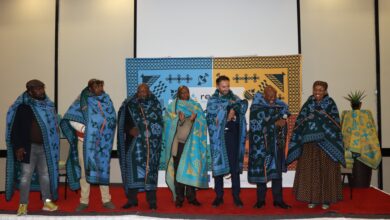TLOUTLE Holdings Board Inaugurated to Manage NUL Businesses

The newly-appointed Board of Directors of the National University of Lesotho’s (NUL) Tloutle Holdings 1 (PTY) LTD was inaugurated on Tuesday, 26 June, 2018 at the Institute of Extra Mural Studies.
Tloutle Holdings 1 (PTY) LTD is a registered company that was established by the NUL Council to fill the space of the commercial side of the University by managing the NUL commercial entities in order to ensure they generate revenue and create jobs.
The Board of Directors of Tloutle Holdings 1 comprises the Chairperson, Mr. Lerata Pekane (currently the Principal Secretary in the Ministry of Small Businesses); the three Directors namely: Mr. Chabeli Ramolise (also the Deputy Chairperson of this Board, an economist and former member of the Lesotho Revenue Authority and the Water and Sewarage Company Boards); Mr. Simon Kuena Phafane (a renowned entrepreneur and former chairperson of the Lesotho Chamber of Commerce and Industry) and; Dr. ‘Maliako Louisa Mojela (a renowned businesswoman currently residing in South Africa).
Speaking at the inaugural meeting, NUL Vice Chancellor, Prof. Nqosa Leuta Mahao indicated that the NUL Council deemed it necessary to establish such a company because the environment in which NUL operates allows the University to go into business in order to generate short-stream income.
“NUL has, for years, been engaged in a number of operations which have not been efficiently run in a business model but as projects. Entities such as the Sefika Shopping Complex, NUL Housing Estate, Sebabatso yoghurt factory and projects within the NUL Innovation Hub need to be run as fully-fledged businesses that generate income to sustain the University”, Prof. Mahao stated.
With the support of the Lesotho National Development Corporation, NUL will launch at least ten factories in the Roma valley, which the Tloutle Holdings 1 will take control of and run the projects as they come through on a business model.
“NUL and the LNDC are working on feasibility studies to develop NUL-LNDC Industrial Park within the Roma Valley in an effort to create jobs through academic research. The park will host a number of factory shells and necessary infrastructure to support production activities at a site yet to be determined. It will house a number of businesses that will have come out of NUL innovation activities”, he highlighted.
Prof. Mahao expressed his confidence in the new Board of Directors and the company itself to take NUL to greater heights.
“We have roped in people with depth of knowledge and skill to lead the company and therefore adding value to NUL. To the nation, one is satisfied that bit-by-bit we are responding to common criticism that NUL is not responding to funding its own diminishing resources; we will soon have a University that can self-sponsor most of its activities without much reliance on the public purse”, he added.
When accepting the leadership position, the new Chairperson of the Board, Mr. Lerata Pekane expressed his excitement about the engagement and promised to work with his team to lead Tloutle Holdings.
“I welcome the challenge to help the University achieve its mandate not only as an academic enterprise but also as a well-run business. Essentially, NUL is redefining itself as a business entity whereby NUL researchers’ (staff and students) ideas will be developed into businesses that have impact on the development of the country and the lives of Basotho”, Mr. Pekane affirmed.
In the same breath, the new Deputy Chairperson, Mr. Chabeli Ramolise accepted the challenge and promised to work to his ability to commercialise NUL research for the public consumption and generation of revenue.
“From a business perspective, this is a paradigm shift by NUL moving from being only an academic enterprise to incorporating the franchising and patenting of research ideas so that the University, lecturers and students get their share when the ideas are industrialized”, added Mr. Ramolise.
NUL is a 100 per cent owner of shares in the Tloutle Holdings 1. In a phased manner, NUL will transfer some of its business entities to the Company to run on behalf of NUL. An agreement is yet to be drawn between the Council and the Company on the handing over of the business to Tloutle Holdings 1 Company. The company is also charged with sourcing funds for such business entities.
Among the others, the company will engage in the running of activities such as the raising of poultry; chicken abattoir; mixed farming; mining and quarrying of stone, sand and clay; processing and preserving of fruits and vegetables; manufacture of dairy and bakery products, perfumes, soap and cleaning detergents; real estate activities with own or leased property as well as; other amusement and recreation activities.
Background
For years, NUL has had a footprint in business but does not have a company/companies that run such businesses efficiently. For instance, the Sefika Shopping Complex (which is 15 years old now) generates a modest profit for NUL (M3 – 4million per year). The complex is on a land owned by the Lesotho Evangelical Church of Southern Africa (LECSA) and NUL will pay ground rent until the business is 40 years old after which NUL will quit and leave the ownership of the business to the owner of the land.
NUL Estates (houses) have been inefficiently run with low maintenance which led to a low turnover. The farm is mainly for students’ practicals and produces livestock, eggs, maize and horticulture. As for the yoghurt factory, it is not yet easy to talk about tangible profit since it is less than one year old.
Upcoming projects include a bakery (which will be complete in August 2018); a chicken abattoir (which has just started with 1000 chickens); a mine within the Phuthiatsana River for quartz to manufacture tiles, table tops and tombstones. NUL does not have the capital or machinery to fund most of these projects hence Tloutle Holdings will seek funders for the projects on behalf of the University.
NUL, through the NUL Innovation Fund (NULIF) under NUL Innovation Hub (NULIH), has partnered with LNDC to work on feasibility studies to develop the NUL-LNDC Industrial Park within the Roma Valley; in an effort to create jobs through academic research. The park will host a number of factory shells and necessary infrastructure to support production activities at a site yet to be determined. It will house a number of businesses that will have come out of NUL innovations and research activities. LNDC was a partner of choice due to its experience in the implementation of the country’s industrial development policies and a pivotal industrial development promoter.
The NUL Innovation Hub building will be finished by September 2018. Tloutle Holdings will be invited to come and assess all the potential ideas and enterprises to be transferred into business; taking into consideration issues of patents and copyrights.
As a result, the company, Tloutle Holdings is expected to bring business acumen to the entities by putting them on a firm business footing.
Initially, the Board’s tenure of office will be one year and after review, this will be extended to possibly three years.
Involvement of Students
Students’ involvement begins at the laboratories in partnership with their supervising lecturers. Those students who leave the University are encouraged to establish their own businesses or small industries and/or partner with NUL. For instance, those with chicken farms will feed into the chicken abattoir.
As ideas are turned into business, they will be patented and copyrighted. Proceeds from sales and royalties shall be divided amongst the University and researchers (students and respective supervisors).
NUL is rolling out entrepreneurial studies so that at the end of study tenure, very student shall have taken courses within the entrepreneurship programme. This will furnish every student with skills necessary to establish a business. Thus, NUL is creating a generation that is liberating itself and making Lesotho a far more productive nation than we have ever been in the last 50 years.
One of NUL’s strategic visions is to establish a School of Engineering to in order manufacture ten-fold what comes out of laboratories. By 2019, there will be a fully-funded project for the construction of a building for the School of Engineering with support from several partners including the European Union (EU) and the Millennium Challenge Compact (MCC). These partners believe the innovations will form part of the turning around of the country. The second compact of MCC will focus more on industrialization.
Community Engagement
NUL has engaged in talks with chiefs and communities in the Roma Valley to identify plots to set up at least ten factories by 2020 to produce commodities and employment. Those whose plots of land will be occupied will not be bought out but will be made partners so they grow together with the company. This is much better than giving them money that can easily be spent within a year and drop back into abject poverty.
Local communities are also being sensitized and encouraged to feed in raw materials including agricultural products such as milk, poultry and crops to the factories. Thus, the factories will help shift Lesotho from a consumer to more of a producing country.
Join 'Lesotho News' WhatsApp Channel
Get breaking Lesotho news — delivered directly to your WhatsApp.
CLICK HERE TO JOIN



